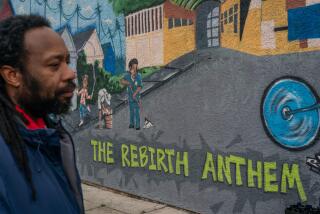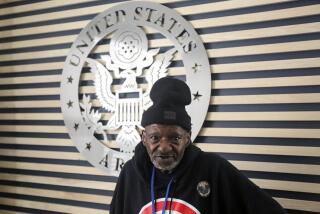War vets invade an urban village
- Share via
Earl Johnson’s boots crunch broken glass from liquor bottles as he walks down an alley in East Baltimore’s Oliver neighborhood.
He is just blocks from the site of the firebombing of a family who called the police on drug dealers and were killed for it, and just yards from some of the most memorable scenes of urban decay in television’s “The Wire.”
At his side are Rich Blake, 32, a Marine Corps veteran; and Jeremy Johnson, 34, a Navy veteran. Like Earl (no relation to Jeremy), they are on a different kind of mission.
They’ve come to this neighborhood once synonymous with the worst of Baltimore to help it become something better. They call this mission Operation Oliver.
As the men walk, they pick up empty Seagram’s gin and Bacardi rum bottles. They point to progress — refurbished homes, a painted playground — and to vacant houses and trash-filled alleys that still need work.
“A lot of the conditions from places we’re deployed to, Iraq and Afghanistan, are not that much different from the conditions here in Oliver,” says Blake, executive director of the 6th Branch, one of several nonprofit groups involved in Operation Oliver.
“We’re not afraid to dig in and make a difference in a community that’s got a bad reputation in the city,” Blake says. “The discipline, the go-get-’em, let’s-do-this-now, aggressive attitude — it really lends itself to community service in a way traditional organizations haven’t been able to do.”
Operation Oliver, which began in July, is a one-year commitment to the neighborhood, the veterans say. It involves cleaning up alleys, rehabilitating homes, organizing volunteers and notifying police about illegal dumping sites and drug dealing.
To say the idea has caught on would be an understatement. Word of the intensive yearlong service project has spread throughout Maryland — and the nation.
Some veterans, such as Earl Johnson, a former Army Ranger who served in Bosnia, Iraq and Afghanistan, have moved into the neighborhood. Others, such as Jeremy Johnson and Blake, live elsewhere but visit Oliver frequently. Nearly 1,000 volunteers, including more than 100 veterans, have joined the effort.
Universities and colleges have been quick to send help too. Even exchange students from France found their way there.
“It’s their second day in America and they’re painting alleys in Oliver,” Blake says.
The improvement is noticeable. Nearly 50 homes are being rehabilitated through Earl Johnson’s organization, the One Green Home at a Time Foundation, another of the partners. Five tons of trash have been hauled away, an area that was once a site of prostitution is now a playground, an organic garden is planned for a weed-filled lot, and the veterans take residents on weekly job-hunting trips.
The neighborhood of about 5,000 people is predominantly black, and more than 70% of Oliver’s households earn less than $25,000 a year. Of its 2,600 properties, more than 1,100 are listed as vacant by the city.
The veterans’ effort hasn’t come without push-back. Their approach — hands on, no community meetings — has made established leaders bristle.
Nina Harper, executive director of the Oliver Community Assn., says she supports the veterans’ work but is critical of what she sees as a lack of communication. If people see a bunch of veterans working in the neighborhood in their military-green Operation Oliver T-shirts, it could send a bad message to those looking to move in, she says.
“We don’t want it to appear to be a war zone, because it’s not,” she says.
Earl Johnson, 30, says he wants to assure Harper and other residents that he and his volunteers are team players.
Still, he has been threatened. As the veterans cleaned up alleys and worked on vacant homes — leaving fewer places for drug dealers and prostitutes to set up shop — they encountered resistance.
One woman said her boyfriend was “going to put a bullet in my head,” Johnson says.
He says the resistance has subsided as the neighborhood has improved. His wife, Zinitha, who once threatened to divorce him over conditions in the area, sees the place differently, he says.
“When we first moved in, my wife really didn’t want to come out and associate with the neighborhood,” Johnson says. “Now this neighborhood is no longer considered a bad neighborhood. This neighborhood is a good neighborhood that’s going to be great.”
More to Read
Sign up for Essential California
The most important California stories and recommendations in your inbox every morning.
You may occasionally receive promotional content from the Los Angeles Times.










